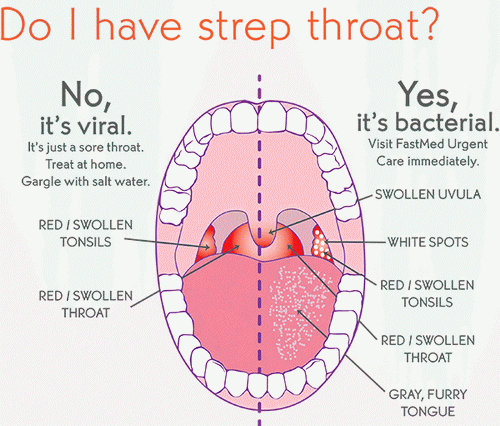updated June, 26, 2021
What is Strep Throat?
 Strep throat is a bacterial throat infection that can be easily treated with antibiotics. It is one of the causes of a sore, scratchy throat – the most frequent reason for people to visit their doctors. But sore throats may also have other causes, of viral nature.
Strep throat is a bacterial throat infection that can be easily treated with antibiotics. It is one of the causes of a sore, scratchy throat – the most frequent reason for people to visit their doctors. But sore throats may also have other causes, of viral nature.
People usually treat sore throats as quickly as possible, because they are among the first symptoms of cold and flu. They usually last for only a few days, if the proper treatment is administered.
Strep throat is extremely contagious and may complicate, generating rheumatic fever, or potential inflammation of the kidneys. Rheumatic fever produces rash and inflammation of the articulations, and it may even damage the valves of the heart.
The most exposed to the risk of strep throat are children aged between 5 and 15, but they are not the only ones. It may affect people at any age. The most common symptoms are tenderness and inflammations of lymph glands inside the neck and fever; small children also experience pain in the abdomen.
In case any of the above-mentioned symptoms are present in your child, visit your doctor. Strep throat is easy to diagnose, so the treatment will be promptly administered.
Strep Throat Symptoms and Signs
The frequent symptoms of strep throat are:
- A hard time swallowing
- Pain in the throat
- Fever
- Vomiting and stomach pain in small children
- Rash
- Headaches
- Inflammation and tenderness in the neck’s lymph glands
- Inflamed, red tonsils that may sometimes have pus formations
There are cases in which patients with strep throat do not experience a sore throat. In other situations, the bacteria don’t affect their carrier, which only transmits it to others around him/her.
The above symptoms are not necessarily caused by strep throat. There are also other conditions that share common signs, such as tonsillitis. The presence or absence of strep throat will be determined by healthcare professionals through a specific test for this condition.

When to Address a Doctor?
The doctor should be informed in case your child or yourself experience one or more of the following signs and symptoms:
- Breathing and swallowing problems
- Rash
- A sore throat for more than 2 days
- Pain of the articulations
- A sore throat that doesn’t involve runny or cold nose
- Both a sore throat and the inflammation and tenderness of ganglions
- A fever higher than 38 C that persists for more than two days
- There are 2 major situations in which a doctor should be called:
- In case the antibiotics do not improve your child’s symptoms after two days of treatment. This may occur even after the end of the treatment.
- In case he/she has a fever or painfully inflamed articulations, rash or breathing problems
The problems mentioned above (fever, articular pain, rash or difficulty to breathe) that follow a strep infection may suggest the presence of rheumatic fever. A possible glomerulonephritis is present, in case your child’s urine has a brown color.
Tests and Diagnosis of Strep Throat
In order to diagnose strep throat, or other possible cause of sore throats, both physical exams and laboratory tests are necessary. The physical exam consists of the search for the bacterial infection, such as swollen ganglions or fever. To obtain a good view of the throat and tonsils, the doctors frequently use a tongue depressor.
The signs of infection are white streaks on the tonsils, red-colored spots on the hard and soft palate, inflammation or a redness of the tonsils. Because the doctor cannot determine the exact cause of the infection (viruses or bacteria), additional tests are required, especially because there are viral infections that look more severe than the aspect generated by streptococcal bacteria.
The following test is designed to detect the bacterial infection, such as strep throat:
- Rapid DNA test gives the diagnosis of strep throat in less than one day from its apparition. It is a new test that uses DNA technology and it equals the accuracy of culture tests, but it is quicker.
- Throat culture tests involve a sterile swab, which takes a sample of the mucus, on the tonsils, and the back of the throat. The sample is then taken to laboratory and cultured to detect the presence of bacteria. The test isn’t painful, but the results are only available the next day.
- Rapid antigen tests – has a quicker result then throat culture and involves a part of the same sample. The results are given after a few minutes and show whether strep throat bacteria are present or not. In case the results are positive, antibiotic treatment should be started immediately. Their disadvantage is that there are times in which they fail to recognize strep throat infection; this increases the necessity for the results of pharyngeal exudate, especially in case of negative results.
Strep Throat Causes
What causes strep throat? Strep throat is caused by a bacterial infection with Streptococcus pyogenesis, or group A hemolytic Streptococcus.
Streptococcal bacteria spread, when someone coughs or sneezes and it also affects people around that person, because it has a contagious character. It also may be picked up from any surface and then – transmitted or transferred to the mouth or nose; such surfaces are a doorknob, bathroom and kitchen objects.
Best Antibiotics For Strep Throat

What are the best antibiotics for strep throat – it is a common question for people suffering from this disease. For the treatment of strep throat in both children and adults cases, antibiotics are prescribed. The most frequently used are oral antibiotics, like amoxicillin (Trimox, Amoxil), penicillin, clindamycin (Cleocin), cephalosporin (Keflex, Ceclor), azithromycin (Zithromax) or clarithromycin (Biaxin). In children that vomit and are unable to swallow, penicillin may also be administered by injection.
The treatment with one of these antibiotics deals with the symptoms speeds up the recovery process, reduces the risks of complications that may derive from untreated strep throat and prevents the extension of the infection to other people.
Antibiotics should improve your or your child’s symptoms in less than 48 hours. In case they don’t seem to be effective for your child, the doctor must be informed. Children that feel good and have obviously milder symptoms as a consequence of antibiotic treatments will stop being contagious the next day from the beginning of treatment and they may return to school or kindergarten. Even if the symptoms disappear, the medications still need to be taken for as long as it was prescribed, in order to prevent severe complications like the inflammation of the kidneys or rheumatic fever.
In order to diminish the fever and to relieve the pain in the throat, ibuprofen (Motrin, Advil) or acetaminophen (Tylenol) may be prescribed together with antibiotics. Aspirin may be dangerous for very small children: it may generate Reye’s syndrome, a possibly lethal disease. Acetaminophen should also be taken in small doses to avoid the risks of serious complications.
How To Prevent Strep Throat?
Means to prevent strep throat.
The hygiene of your and your child’s hands is very important in order to prevent many infections. A proper and regularly performed cleaning of the hands can spare you a large number of undesired complications. Use a hand sanitizer based on alcohol or even water and soap.
Children must be taught not to sneeze or cough without covering their mouth. The drinking glasses, forks or spoons used by your child with strep throat mustn’t be shared; they should be washed in hot water and dishwashers.
Antibiotics destroy the bacteria that caused strep throat with promptitude in the majority of the cases. But, before they do, you may ameliorate the symptoms yourself by the following means:
- A good hydration is very helpful; water will not only hydrate your organism, but it will also lubricate your sore throat, helping you to swallow easier.
- Eat broths, soft-cooked eggs, mashed potatoes, apple sauce, cooked cereals, soups, and yogurts: they are easier to swallow for your sore throat. Other soothing foods are sherbet, frozen fruit pops, frozen yogurts or blended foods. Acidic and spicy foods are not recommended.
- Rest sufficiently, because it helps against the infection. In case you and your child have strep throat, it is best for you not to go to work or school until you get better.
- While your strep throat child stays at home and has antibiotic treatment which should be done for at least one day before the child goes back to school or kinder garden, try to involve him/her in pleasant activities that you don’t usually have time to do, for example playing a game or reading a book together.
- More than one gargling with warm salt water per day should be done; they are very helpful and act as pain relievers for your or your child’s throat. Prepare the gargling liquid from ¼ teaspoons of salt solved in 8 ounces of warm water; the forget to warn your child to spit it out after the gargling is done.
- Avoid irritating factors, such as cigarettes smoke, fumes from paints and cleaning products; they may increase the risk of infection and the irritation.
- The discomfort generated by the strep throat may be ameliorated by an air humidifier, which prevents the increase of irritation in the mucous membranes of the throat. This humidifier should be cleaned every day, because molds and bacteria may develop there, too; the best choice may be a cool-mist humidifier. A saline nasal spray may also help.